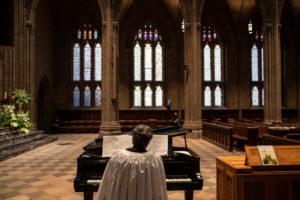
A Sunday service without parishioners, last month in New York.Credit…Victor J. Blue for The New York Times
By Tish Harrison Warren
Excerpt from New York Times: For Christians, the most holy thing on earth — more than communion, the Sistine Chapel, the Holy Grail or the Rocky Mountains — is the human body. This is, in part, why a vast majority of churches in America are setting aside our sacred vessels, bread and wine, and our gathering together to protect vulnerable human bodies. The church itself is called — what else? — the body of Christ.
The story of creation in the Bible reminds us that we humans are bodies. We are not simply brains on a stick or souls trapped in a mortal prison. We believe bodies and souls are inseparably entwined (which is why Christians and other religious groups care so much about eating, drinking and sex, not because we think the body is bad or dirty, but because we think it is mysteriously connected to our very soul, but that may be for another essay).
And we believe that God came not as a book or a codex of laws or as a hologram or a creed or an idea, but as a person in a body, Jesus. In assuming a body, God redeems embodiment itself. Therefore, we believe in the resurrection not merely of the soul, floating away to some ephemeral mist, but also of the body.
Before two weeks ago, it was pretty easy to ignore the brute fact of our embodiment. … This virus has exposed that we have whole segments of society that do not have paid sick leave, and human resource policies and cultures that depend upon overlooking the pesky reality that any worker has a limited and needy body that deserves care.
We must embrace social distancing, for as long is as needed, to protect our health care system and the very real, fleshy bodies of millions of people. But we also need to collectively notice that something profound is lost by having to interact with the world and our neighbors in mostly disembodied, digital ways. This is something to lament and to grieve. And like all grief, it exposes the value and glory of the thing that was lost.
When social distancing is over, however many weeks or months that may take, I hope we each go get a strong coffee with a friend, go on a walk together and notice what a complete gift it is to do so — the remarkable grace of having a body alongside other bodies, on an ordinary day. What a quotidian, overlooked wonder we find in the textured tangibility of the physical world. And I hope that I, for one, never again take these ordinary gifts for granted.
Read her entire column HERE.
